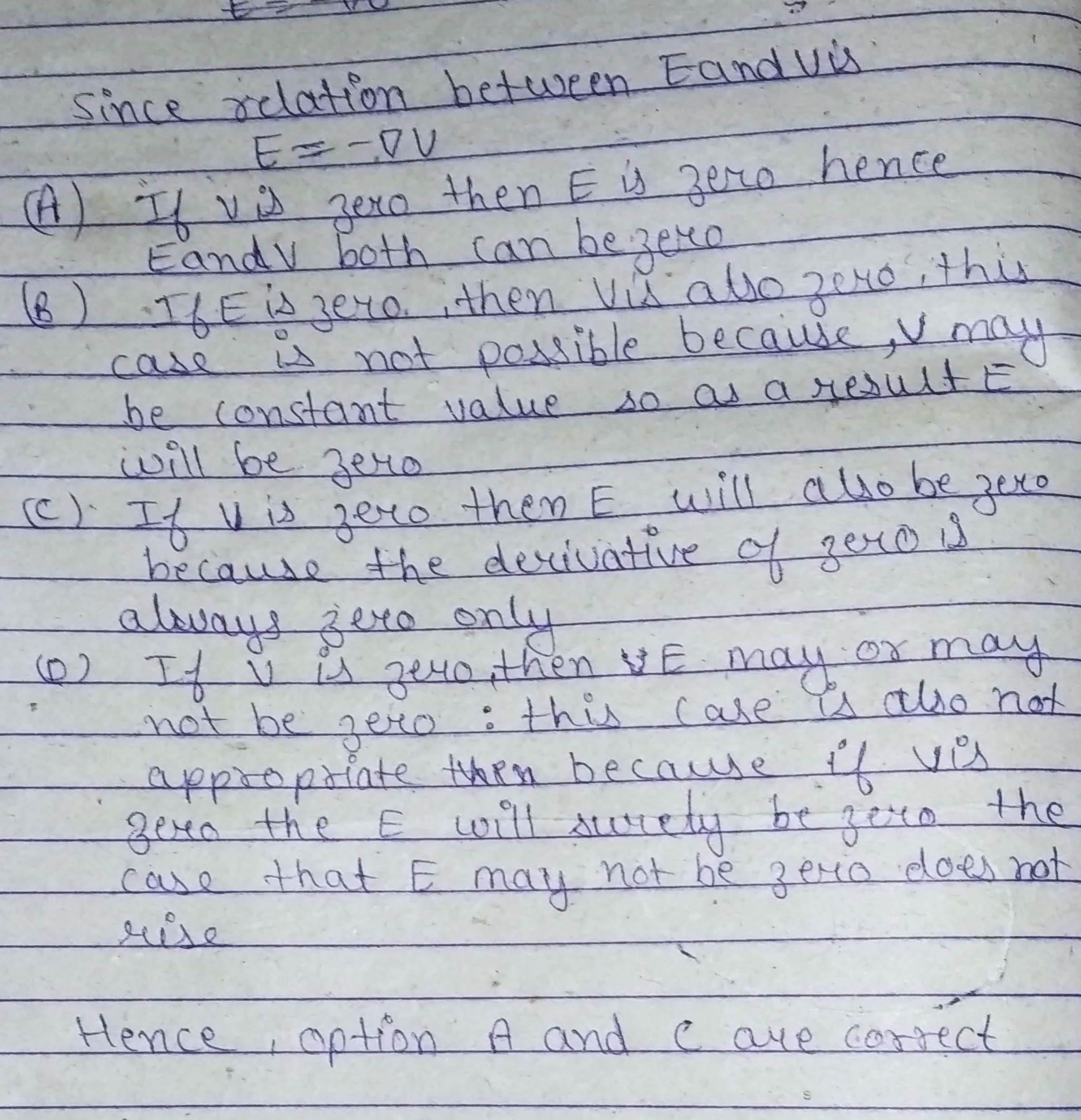Time management is very much important in IIT JAM. The eduncle test series for IIT JAM Mathematical Statistics helped me a lot in this portion. I am very thankful to the test series I bought from eduncle.
Nilanjan Bhowmick AIR 3, CSIR NET (Earth Science)- IIT JAM
- Physics (PH)
For any point in space, correct statements about electric field (e) and potential (v) are (a) (b) (c) (d) e and v both can be zero. if e is zero, then v is also
For any point In space, correct statements about electric field (E) and potential (V) are (A) (B) (C) (D) E and V both can be zero. If E is zero, then V is also zero. If V is zero, then E is also zero. If V is zero, then E may or may not be zero.
- 1 Likes
- 5 Comments
- 0 Shares
-
![comment-profile-img]() >
>
-
![comment-profile-img]() >
>
Dhairya sharma
dear see the some conclusion from electrodynamics: 1.E and V both can be zero. 2.If V=0, E may or may not be zero. 3.If E=0, V may or may not be zero. In the options only 1 and 2 conclusions are given. So ans is a and d.
![eduncle-logo-app]()
for doubts plz ask dear
![eduncle-logo-app]()
mam, i will send u a similiar question
![eduncle-logo-app]()
plz reply me
![eduncle-logo-app]()
what will be its answer
![eduncle-logo-app]()
if potential 0 then field must be zero
![eduncle-logo-app]()
but field 0 doesn't mean potential should be 0
-
![comment-profile-img]() >
>
-
![comment-profile-img]() >
>
Somnath Best Answer
It depends on what you mean when you say V=0V=0. In the context of the equation: E=−∇V which holds specifically in electrostatics V is a scalar field, meaning that it is actually a function which assigns every point in space a scalar value. E is a vector field, which assigns a vector to every point in space. Thus, both the electric field and the potential are dependent upon position. This can be shown more explicitly as: E⃗ (r)=−∇V(r) where r is a position vector. Now, if V(r)=0 for all r then certainly the gradient is also zero everywhere, and thus, the electric field is zero everywhere. On the other hand V(r) may equal zero for only some r. For example, at the point P midway between two point charges, one with charge +q and the other with charge −q the potential is zero but field is non zero. Because if you move even slightly away from this point, the potential is non zero. The fact that the potential is changing at point P indicates that the gradient at this point is non zero. Thus, the electric field at P is non zero, even though the potential itself is zero at P. Similarly at the midpoint between two same charge q potential V is non zero but field E is zero. Thus we may conclude that 1.E and V both can be zero. 2.If V=0, E may or may not be zero. 3.If E=0, V may or may not be zero. In the options only 1 and 2 conclusions are given. So ans is a and d.
![eduncle-logo-app]()
sir, may sir, may i sent u a similiar question
![eduncle-logo-app]()
how it comes
![eduncle-logo-app]()
delta neighbourhood means space around a point very close to the point.Since here potential is zero in the neighbourhood point also then the gradient of potential is zero.We know negative gradient of potential is electric field [E⃗(r)=−∇V(r)].Since gradient is zero so field must be zero here. Answer should be option A.
![eduncle-logo-app]()
thank u
Do You Want Better RANK in Your Exam?
Start Your Preparations with Eduncle’s FREE Study Material
- Updated Syllabus, Paper Pattern & Full Exam Details
- Sample Theory of Most Important Topic
- Model Test Paper with Detailed Solutions
- Last 5 Years Question Papers & Answers
Sign Up to Download FREE Study Material Worth Rs. 500/-











 >
>

 >
>

 >
>
 >
>







Shriyank Umrao![best-answer]()
No, just because the electric field is zero at a particular point, it does not necessarily mean that the electric potential is zero at that point. A good example is the case of two identical charges, separated by some distance. At the midpoint between the charges, the electric field due to the charges is zero, but the electric potential due to the charges at that same point is non-zero. The potential either has two positive contributions, if the charges are positive, or two negative contributions, if the charges are negative...................Also if just because the electric potential is zero at a particular point, it does not necessarily mean that the electric field is zero at that point. A good example is the case of a dipole, which is two charges of the same magnitude, but opposite sign, separated by some distance. At the midpoint between the charges, the electric potential due to the charges is zero, but the electric field due to the charges at that same point is non-zero. Both the electric field vectors will point in the direction of the negative charge........so i think only option D is correct
thank u sir